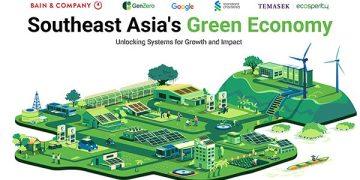Introduction
In recent years, the global economy has witnessed increasing trade tensions between major economic powers, particularly between the United States and the European Union. These two global giants have historically shared strong economic ties, but in the past few years, trade disputes have become more frequent and intense. These tensions have not only affected the US and EU but also have profound implications for the broader global economy. With issues ranging from tariffs to regulatory disputes, the question remains: Will the ongoing US-EU trade tensions ultimately lead to a global recession?
In this article, we will explore the underlying causes of US-EU trade tensions, analyze the potential economic fallout of these disputes, and evaluate whether a global recession is an inevitable consequence. By understanding the various factors at play, we can better predict the possible outcomes and the broader implications for both regional and global economies.
1. Background: US-EU Economic Relations
The United States and the European Union have long been key partners in global trade, accounting for a substantial portion of the world’s economic output. In 2021, the trade between the US and EU represented about 30% of global GDP, with trillions of dollars in goods and services flowing across the Atlantic each year. This robust trade relationship has been bolstered by shared values, cultural ties, and political alignment. However, in recent years, friction has grown between the two economic powers, fueled by differing political priorities, economic policies, and global strategies.
Key areas of tension have emerged in several industries, including aerospace, agriculture, digital services, and environmental standards. The conflict has intensified under different US administrations, particularly with the policies of former President Donald Trump, who implemented a series of tariffs on EU goods and questioned the viability of long-standing multilateral trade agreements.
2. The Rise of Protectionism: A Shift in Global Trade Dynamics
The rise of protectionist policies, particularly under the Trump administration, has significantly altered the global trade landscape. The US implemented steel and aluminum tariffs on EU imports, while the EU responded with tariffs on a wide range of US products, from agricultural goods to motorcycles. The trade dispute also extended to the technology sector, with the US accusing European countries of imposing unfair digital taxes on US-based tech giants like Google and Amazon.
The trade war between the US and China, which also heavily involved the EU, further exacerbated these tensions. As the US sought to counteract China’s growing economic power, the EU was caught in the crossfire, as many European companies rely on Chinese manufacturing and trade partnerships. As a result, the EU found itself balancing the need to maintain its relationship with both the US and China, leading to complicated diplomatic challenges.

3. Key Areas of US-EU Trade Tensions
Several key areas of trade tension have dominated discussions between the US and the EU, including:
- Tariffs and Trade Barriers: The imposition of tariffs has been one of the most visible elements of the trade tensions. The US placed significant tariffs on steel and aluminum imports from the EU, and the EU retaliated with tariffs on American products. These tariffs have hurt industries on both sides, leading to higher prices for consumers and decreased market access for exporters.
- Aerospace and Aircraft Subsidies: One of the longest-standing trade disputes has been over government subsidies for aerospace giants Boeing and Airbus. Both the US and the EU have accused each other of providing unfair subsidies to their respective aircraft manufacturers, leading to retaliatory tariffs on both sides.
- Agriculture and Food Products: Agricultural trade has also been a contentious issue, with the EU implementing stricter regulations on genetically modified organisms (GMOs) and hormones in meat, which has led to restrictions on US exports of certain agricultural products. On the other hand, the US has pushed for greater market access to European agricultural markets, particularly for hormone-treated beef.
- Digital Services and Taxation: With the rise of the digital economy, tensions have also flared over the taxation of large tech companies. The EU has introduced digital taxes on US tech giants like Apple, Google, and Amazon, which have been met with resistance from the US government, claiming these taxes unfairly target American firms.
4. The Economic Impact of US-EU Trade Tensions
The US and EU are among the largest economic blocks in the world, and any disruption in their trade relationship has far-reaching consequences. While the direct economic impact of tariffs and trade restrictions may seem contained to specific industries, the broader repercussions can be significant.
- Slower Economic Growth: Trade disruptions between the US and EU could lead to slower economic growth for both regions. Higher tariffs and trade barriers can increase costs for businesses and consumers, which may reduce consumption and investment. Lower growth in the US and EU would negatively affect global markets as these two regions are key drivers of global economic activity.
- Disrupted Global Supply Chains: The US and EU are integral parts of global supply chains, particularly in industries such as automotive manufacturing, technology, and aerospace. Trade tensions that disrupt these supply chains can have ripple effects across the world, leading to increased production costs, delays in product delivery, and shortages of goods.
- Investor Confidence: The uncertainty created by trade disputes between major economies often leads to a decrease in investor confidence. Investors tend to be cautious during periods of trade conflict, pulling back from markets and reducing their exposure to riskier assets. A decline in investment could slow economic recovery efforts and make it more difficult for businesses to thrive.
- Impact on Developing Economies: As the US and EU are both major global economic players, trade tensions between them also affect developing economies that rely on trade with these two regions. For example, countries in Africa, Asia, and Latin America may find their export markets reduced, or they may face higher costs for goods due to trade barriers imposed by the US and EU.
5. Can US-EU Trade Tensions Lead to a Global Recession?
The potential for US-EU trade tensions to trigger a global recession depends on several factors, including the severity and duration of the trade disputes, the broader global economic environment, and the responses of other major economies. While trade tensions between the US and EU have already had a significant impact on global markets, a full-blown global recession would require a confluence of negative factors.
- Global Economic Slowdown: A global recession could occur if trade tensions spill over into other areas of the world economy. For example, if other countries, such as China or Japan, were to retaliate against the US or EU in response to trade policies, it could lead to a slowdown in global trade and a reduction in overall economic activity.
- Financial Market Instability: Financial markets are sensitive to trade disputes between major economies. If the US-EU tensions lead to a further deterioration in investor confidence or cause stock markets to decline, it could result in a broader economic slowdown. The interconnectedness of global financial markets means that instability in the US or EU could quickly spread to other regions.
- Monetary Policy Response: Central banks, particularly the US Federal Reserve and the European Central Bank, play a crucial role in mitigating the effects of trade disruptions. If trade tensions escalate, central banks could lower interest rates or implement other stimulus measures to offset the negative effects. However, prolonged trade disputes could limit the effectiveness of monetary policy.
6. Conclusion: Navigating the Future of US-EU Trade Relations
While US-EU trade tensions have created significant challenges for both regions, it is not inevitable that they will lead to a global recession. The outcome will depend on the ability of both the US and the EU to negotiate and resolve their differences through diplomacy and trade agreements. Additionally, global economic conditions, including the recovery from the COVID-19 pandemic, will play a crucial role in shaping the future economic landscape.
Efforts to resolve trade disputes, such as the US-EU trade talks under the Biden administration, provide hope that tensions may be mitigated in the future. However, as global economic interdependence continues to grow, it is essential for both the US and the EU to find common ground to ensure a stable and prosperous global economy. The world is watching closely to see whether these two economic giants can find a way to navigate their differences without triggering a broader global recession.



































